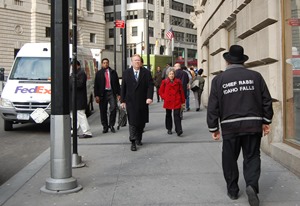
With just a passing glance, you might mistake him for a character on one of Comedy Central’s mock news shows, but take a second look. You really did just pass the chief rabbi of Idaho Falls, walking down a street in lower Manhattan. The honorary chief rabbi, that is. His name is Rabbi Avraham (Avi) Juravel, and his day job is supervisor of technical services for OU Kosher.
“Random people stop me on the streets of New York City, asking, ‘How’s Idaho?’ Rabbi Juravel says, with a warm smile. “So I tell them, it’s a wonderful place.”
Overseeing technical services for OU Kosher certification for more than 20 years, Rabbi Juravel had been traveling to Idaho about four times a year to inspect more than a dozen OU certified companies there that manufacture potato products.
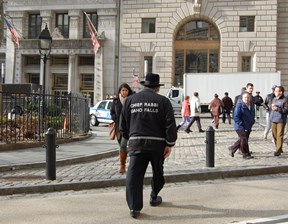
Idaho Falls, alone, is home to multiple products certified kosher by the Orthodox Union. To get there, Rabbi Juravel flies from his home in the Greater New York area to either Salt Lake City or Denver, then hops aboard a much smaller plane to Idaho Falls. He could always drive, of course, but flying is the quicker route.
Tucked away in Eastern Idaho, four hours east of Boise, the state capital, Idaho Falls boasts a population of 56,813, as of the 2010 census. Among them are approximately ten families with Jewish members. Most of them work at a nearby nuclear plant, according to Rabbi Juravel.
After undergoing a liver transplant last winter, Rabbi Juravel’s travel is limited, of late, precluding trips to his beloved Idaho Falls, though, as he regains his health, he hopes to resume his flying schedule.
So how did Rabbi Juravel become the honorary chief rabbi of a town in which he does not reside?
One day, years ago, a worker at an OU-certified company told him about a store in town run by a Jewish woman, and encouraged him to visit. In his experience, in a small town, “every non-Jew knows where a Jew lives,” observed Rabbi Juravel. “Doesn’t matter how few may live in that town. I went to visit this lady and she was so happy to see another Jew. She complained to me that her children were being discriminated against in school because they are not Mormons.” Idaho Falls has a large Mormon community.
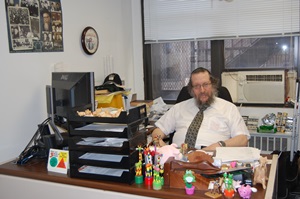
As a former student of Beth Medrash Govoha in Lakewood, NJ, from where he received his rabbinic ordination, Rabbi Juravel offered to teach a class on various aspects of Judaism at this woman’s home each time he traveled to Idaho Falls. He would discuss the weekly Torah portion or an upcoming Jewish holiday. “We would get together just to remind them that they’re Jewish — that they should know what it means to be Jewish and that New York didn’t forget them,” shared Rabbi Juravel. “They were very interested in this.”
After a time, Rabbi Juravel decided to approach the mayor of Idaho Falls and request to be appointed the town’s honorary chief rabbi. After all, he realized, he was more involved with the local Jewish community than any other rabbi.
He approached Linda Milam, who served as mayor of Idaho Falls from 1994 to 2006, with his request, to which she inquired, “Doesn’t your church do that?” Rabbi Juravel explained to her that in the Jewish religion, the mayor of a town could appoint a chief rabbi. But as a resident of Monsey, NY, Rabbi Juravel requested that he only be deemed an “Honorary Chief Rabbi” so that he wouldn’t be entitled to any benefits.
A framed document stamped with the golden seal of the City of Idaho Falls, hangs proudly in Rabbi Juravel’s office at the OU. His jacket identifying him as the chief rabbi was a gift from one of the town’s potato companies.
Has he ever been asked to use his title for public service?
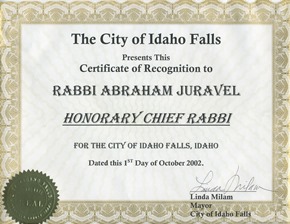
Once, Rabbi Juravel said, he was approached by someone at a company he was inspecting, who informed him that a Jewish man in a local nursing home had just gone through a seventh round of chemotherapy and that his prognosis did not look good. The dying man wished to see a rabbi, and this company worker asked Rabbi Juravel to visit. “They didn’t know where to find a rabbi, and when I was in Idaho, they saw my jacket,” Rabbi Juravel recalled.
At the nursing home, Rabbi Juravel introduced himself to the dying man and showed him his credentials, pointing to the back of his jacket. “I asked him where he’s from, and he says Brooklyn. I say, ‘I’m from Brooklyn—what part are you from?’ He says Bay Ridge. ‘Oh, that’s the fancy part — I’m not so fancy, I’m from East New York.’ So, I got a smile from him.”
Rabbi Juravel asked the man if he was bar mitzvahed. He was. Did he remember the Shema? Yes. So Rabbi Juravel suggested that they say it together. “I said Shema with him and he was very happy,” Rabbi Juravel said. The man passed away two weeks later.
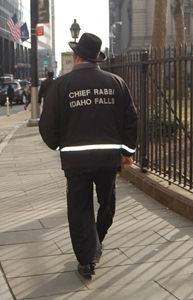 On a happier note, the relationship Rabbi Juravel built up over the years with the Jewish shopkeeper allowed him to encourage her to send her children to Israel on the Taglit-Birthright Israel program, when they began college. Two out of three have already gone. “The mother had raised her children as best as she could for a Jewish education — even paying for private tutors when they became bar or bat mitzvahed and holding the ceremony by their grandparents in Arizona, but I told her that sending them to Israel is a world of difference when it comes to identifying Jewishly,” Rabbi Juravel said.
On a happier note, the relationship Rabbi Juravel built up over the years with the Jewish shopkeeper allowed him to encourage her to send her children to Israel on the Taglit-Birthright Israel program, when they began college. Two out of three have already gone. “The mother had raised her children as best as she could for a Jewish education — even paying for private tutors when they became bar or bat mitzvahed and holding the ceremony by their grandparents in Arizona, but I told her that sending them to Israel is a world of difference when it comes to identifying Jewishly,” Rabbi Juravel said.
So how often does he wear that “official jacket?” Let’s put it this way: “I wear the jacket every single day, except Shabbos,” he said. “I’d like to wear it — it’s warmer than my other coat — but my wife won’t let me get away with that.”
The words of this author reflect his/her own opinions and do not necessarily represent the official position of the Orthodox Union.
